In the rapidly evolving digital marketplace, Magento 2 stands out as a cornerstone for building robust and scalable eCommerce platforms. Known for its flexibility, extensive feature set, and strong community support, Magento 2 has cemented its position as a key player in the eCommerce landscape. Its comprehensive suite of tools and features enables merchants to create highly customized and powerful online stores. Among these features, Magento 2 reports play a pivotal role in steering businesses toward success by providing insightful data and analytics.
In today’s data-driven economy, the importance of data analysis and reporting in eCommerce cannot be overstated. It is through meticulous analysis of data that businesses can understand customer behavior, track performance metrics, and make informed decisions that drive growth and profitability. Magento 2 reports are instrumental in this regard, offering a deep dive into various aspects of the online business, from sales and customer behavior to inventory and marketing efficiency. By leveraging these reports, merchants can identify trends, pinpoint areas for improvement, and strategize effectively to enhance their online presence and sales.
Table of Contents
Magento Reports: An Overview
In the digital age, where every click, every view, and every transaction can be tracked, Magento 2 reports emerge as a vital tool for eCommerce success. The reporting feature in Magento 2 is not just about numbers and charts; it’s about unlocking the potential of your eCommerce store through data-driven decisions. This part of our blog post delves into the intricacies of Magento 2 reports, providing a foundation for merchants to leverage these insights effectively.
Overview of Magento Reporting
The reporting dashboard in Magento 2 serves as the nerve center for monitoring the health and performance of your eCommerce store. It’s here that data comes to life, offering a visual snapshot of your business’s vital statistics. From sales trends to customer activities, the dashboard aggregates data across various metrics, presenting it in an intuitive and accessible manner. This centralized access to key performance indicators (KPIs) allows merchants to make quick, informed decisions to steer their business strategy.
What do you need the reports for? Well, reports in Magento 2 are indispensable for several reasons. They provide insights into customer behavior, enabling merchants to tailor their offerings and marketing strategies to meet customer needs more effectively. Additionally, these reports help identify best-selling products, track inventory levels, and monitor the effectiveness of promotional campaigns. In essence, Magento 2 reports are crucial for optimizing operations, enhancing customer satisfaction, and maximizing profitability.
Overview of Different Types of Reports
In general, Magento 2 reports come in five different types: Sales Reports, Marketing Reports, Customer Reports, Product Reports, and Review Reports.
- Sales Reports: Sales reports are at the heart of Magento 2 reporting, offering detailed insights into various aspects of sales performance. They cover everything from order totals, tax summaries, invoiced amounts, shipping fees, refunds issued, coupons used, to settlement reports. These reports help merchants understand sales trends, track revenue streams, and identify areas for improvement in the sales process.
- Customer Reports: Customer reports focus on the buying behavior and engagement of your customer base. They provide data on total orders placed, the number of orders per customer, and new customer acquisitions. These insights are invaluable for developing targeted marketing strategies, improving customer retention, and fostering loyalty.
- Product Reports: The product part in Magento 2 reports offers detailed analytics on product performance. They track metrics such as product views, best-selling items, low stock levels, order quantities, and download counts for digital products. This information is critical for inventory management, product promotion, and catalog optimization.
- Marketing Reports: Marketing reports in Magento 2 provide a window into the effectiveness of your marketing efforts. They track products added to carts, search terms used by customers, rates of cart abandonment, and issues with newsletter delivery. This information is crucial for optimizing marketing strategies, improving product visibility, reducing cart abandonment rates, and enhancing communication with customers.
- Review Reports: Review reports gauge customer satisfaction through feedback and reviews submitted on your eCommerce platform. These reports highlight areas of success and opportunities for improvement, providing a direct line of communication with customers about their experiences and expectations.
In-depth Exploration: 5 types of Magento 2 Reports
Now that we have learned about the five types of Magento 2 reports, let’s dive into in-depth discussion about each type of report, and what purpose they serve.
Sales Reports
Sales Reports in Magento 2 are indispensable for merchants aiming to closely monitor and enhance their store’s sales performance. These reports provide a comprehensive breakdown of sales data, offering insights not just into the volume of sales but also into the nuances that influence overall performance. By dissecting sales into categories such as Order Totals, Tax Reports, Shipping Reports, Invoiced Sales, and Refunds, Magento 2 reports enable store owners to get a clear picture of their revenue streams, understand tax liabilities, manage shipping costs efficiently, and gauge the impact of refunds on their bottom line.
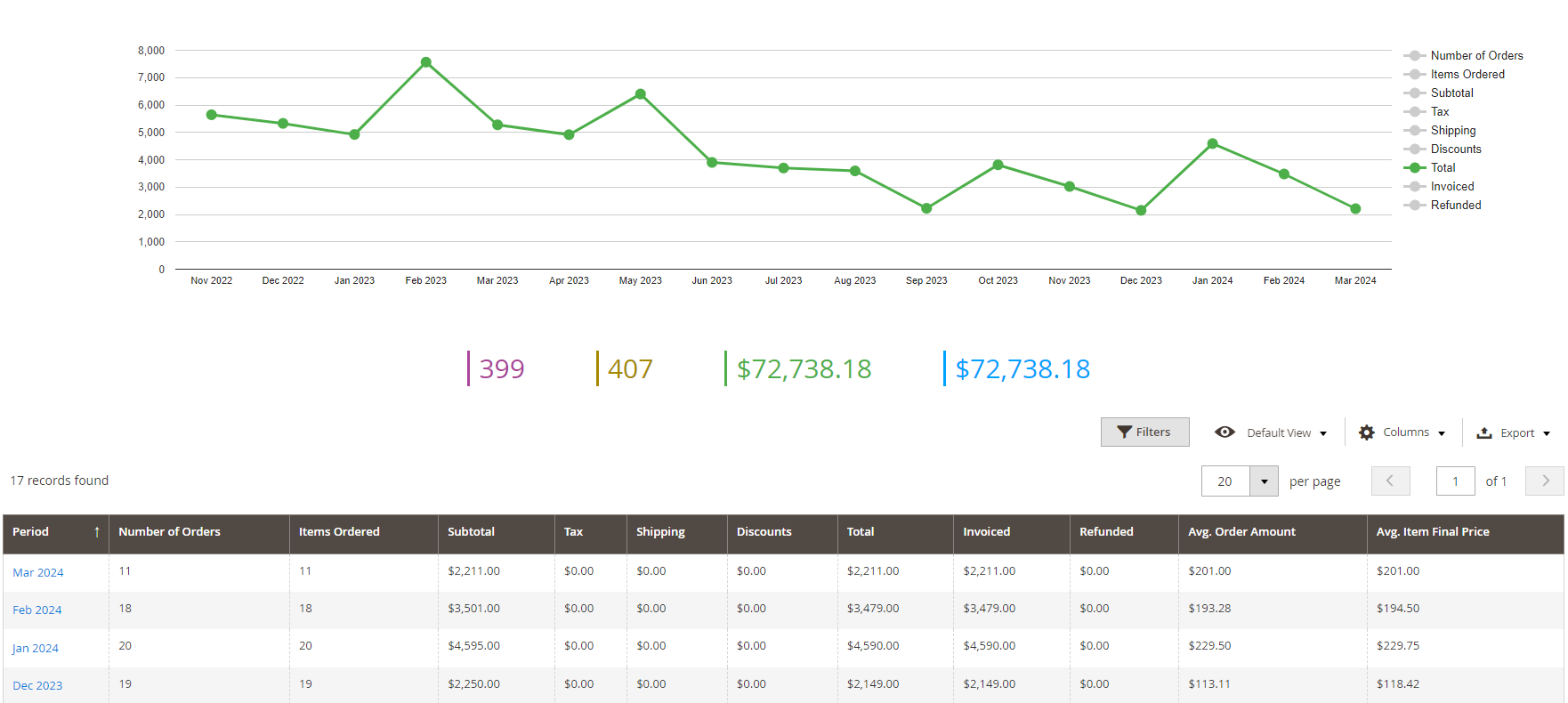
What is it about?
- Order Totals: This aspect of Magento 2 reports allows merchants to track sales performance over different timeframes—daily, monthly, or annually. By analyzing Order Totals, store owners can identify trends and patterns in consumer purchasing behavior, such as peak shopping seasons, holidays, or sales events that drive increased revenue. This analysis helps in forecasting demand and preparing inventory accordingly.
- Tax Reports: Tax management is a critical component of eCommerce that can significantly impact profitability. Magento 2’s Tax Reports provide detailed insights into tax obligations by region, enabling merchants to ensure they are in compliance with local tax regulations. This information is crucial for setting accurate pricing strategies and for financial planning to meet tax liabilities efficiently.
- Shipping Reports: Shipping strategies can directly affect a store’s profitability and customer satisfaction. By analyzing Shipping Reports, merchants can compare the shipping fees collected from customers against the actual shipping costs incurred. This analysis is key to identifying opportunities for reducing overhead, negotiating better rates with shipping providers, or adjusting shipping fees to maintain or improve profit margins.
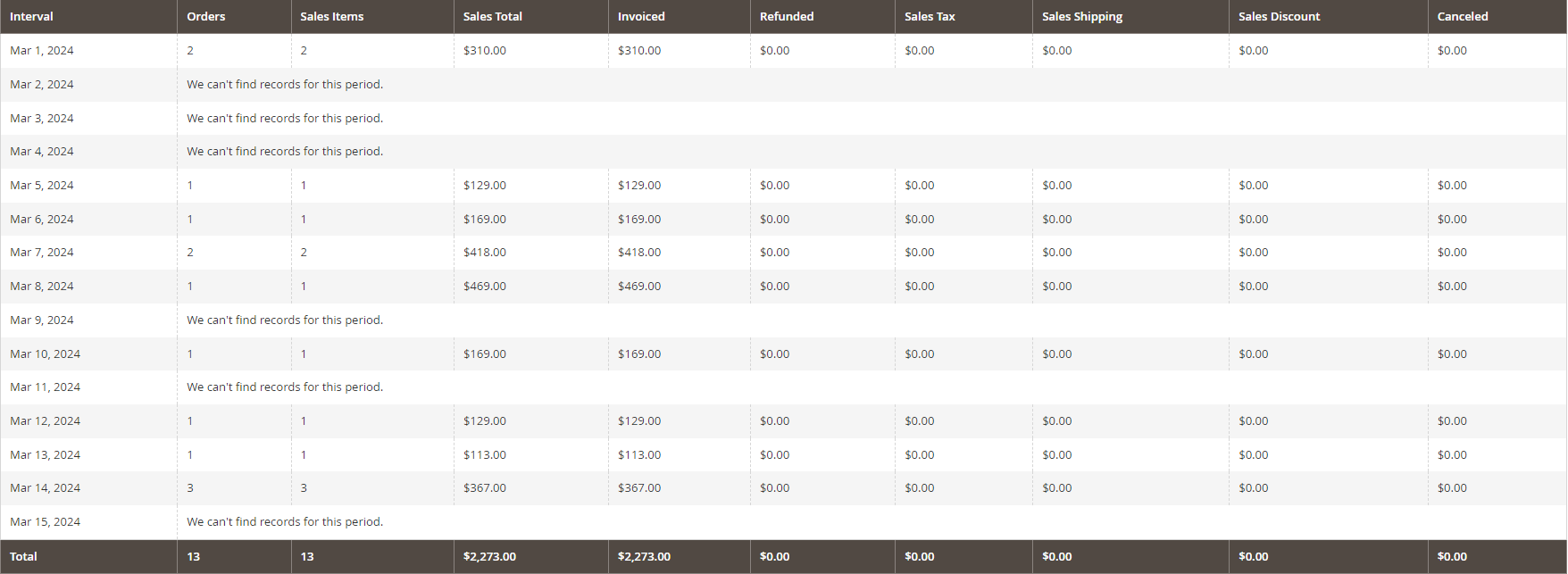
Strategic Application
The strategic application of insights gained from Sales Reports in Magento 2 cannot be overstated. By keeping a pulse on sales performance metrics, merchants can:
- Identify High-performing Periods: Recognizing times when sales are historically strong allows businesses to capitalize on these trends. Planning marketing campaigns, inventory, and promotions around these periods can significantly boost revenue.
- Adjust Pricing and Promotions: Insights from sales analysis can inform dynamic pricing strategies and promotional offers. For example, if analysis shows a dip in sales during certain months, merchants can plan discounts or special promotions to stimulate demand.
- Optimize Shipping Strategies: Shipping costs are a major factor for online shoppers. By understanding the dynamics of shipping fees and costs, businesses can offer more competitive rates, free shipping thresholds, or expedited shipping options to enhance customer satisfaction and loyalty, without eroding profit margins.
In essence, Magento 2 reports offer a treasure trove of data that, when analyzed and applied strategically, can drive significant improvements in sales performance. Sales Reports, with their detailed breakdown and analysis capabilities, empower merchants to make informed decisions that boost sales, optimize operations, and enhance the customer experience.
Customer Reports
In the realm of eCommerce, understanding your customers is as crucial as the products you sell. Magento 2 reports shine a spotlight on this critical aspect through detailed Customer Reports. These reports provide a comprehensive view of customer interactions with your store, from account creation to purchase behavior. By analyzing data on new accounts, order totals by customer, and customer segmentation, Magento 2 reports offer a window into the demographics and behaviors of your customer base, paving the way for more targeted and effective marketing strategies.
What is it about?
- Order Totals by Customer: This facet of Magento 2 reports enables merchants to pinpoint their most valuable customers — those who have spent the most in your store over a certain period. Understanding who these customers are allows for the creation of targeted marketing campaigns designed to reward loyalty and encourage repeat business, such as exclusive offers or early access to new products.
- Customer Segmentation: The power of Magento 2 reports extends into the ability to segment customers based on a variety of criteria, including demographics, purchasing behavior, and order history. This segmentation is invaluable for crafting personalized marketing efforts that speak directly to the interests and needs of different customer groups. For instance, segmentation can identify customers who frequently purchase specific types of products, enabling targeted promotions that are more likely to result in sales.
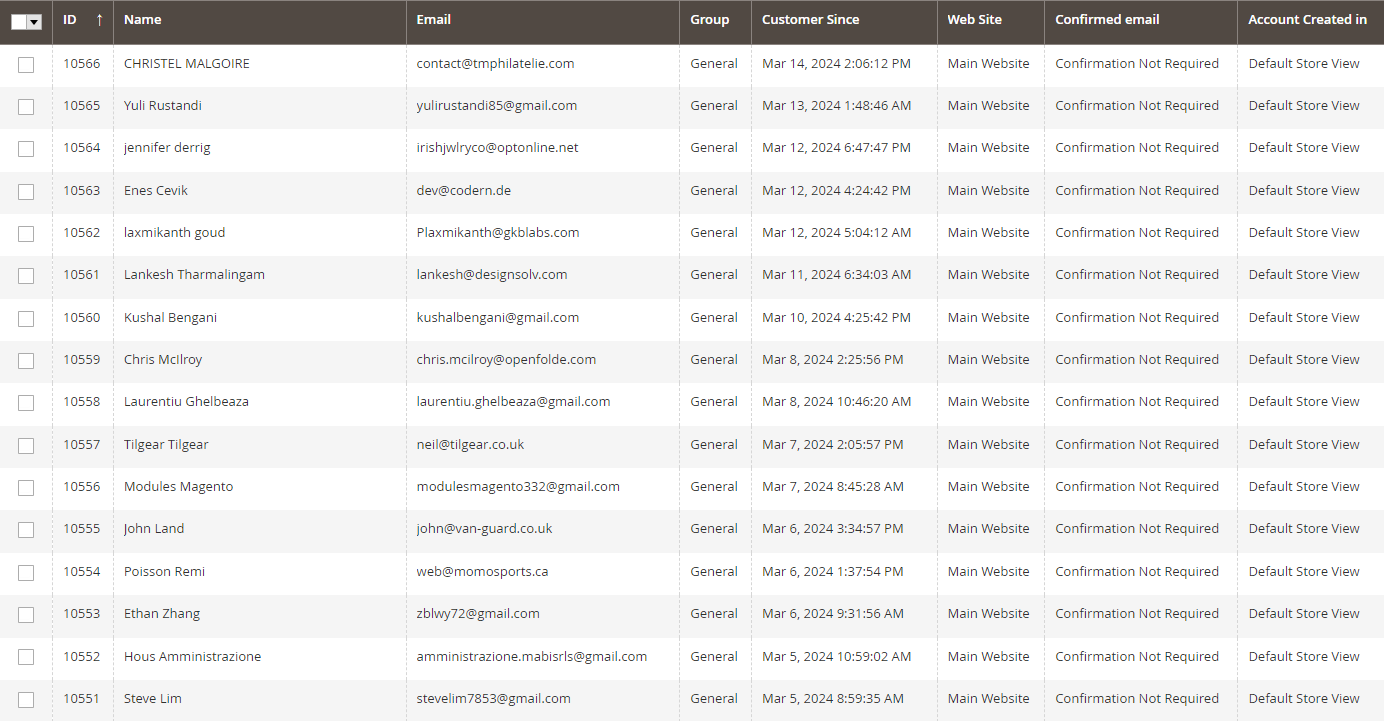
Strategic Application
The strategic application of insights gained from Customer Reports in Magento 2 can significantly impact the success of an eCommerce business. By leveraging the detailed data these reports provide, merchants can:
- Enhance Customer Retention Strategies: Understanding customer behavior and preferences enables businesses to tailor their engagement strategies to increase customer retention. This could involve personalized email marketing, loyalty programs, or custom offers based on previous purchasing behavior.
- Tailor Marketing Messages: With data on customer demographics and behavior, marketing messages can be customized to resonate more deeply with different segments of your audience. This personalization can lead to higher conversion rates, as messages are more relevant and engaging to the recipient.
- Improve Overall Customer Experience: Insights from Customer Reports can inform decisions on website design, product assortment, and customer service improvements. By aligning your store’s offerings and experience with customer preferences and expectations, you can enhance satisfaction, loyalty, and ultimately, the lifetime value of your customers.
Magento 2 reports provide a critical foundation for understanding and engaging with your customer base more effectively. The depth and breadth of Customer Reports in Magento 2 reports enable merchants to dive deep into customer data, uncovering patterns and opportunities that can be leveraged to drive sales, loyalty, and a superior shopping experience. In a competitive eCommerce landscape, the ability to adapt and respond to customer needs based on solid data is a significant advantage, making Customer Reports an invaluable asset for any Magento 2 store owner.
Product Reports
Product Reports in Magento 2 serve as the backbone for strategic inventory management and product performance analysis. These reports offer critical insights into how different products are performing on your eCommerce platform, encompassing Bestsellers, Most Viewed, Low Stock, and Ordered Products. By providing a clear view of product demand, customer interest, and inventory levels, Magento 2 reports empower merchants to make informed decisions about stock management, marketing strategies, and product development.
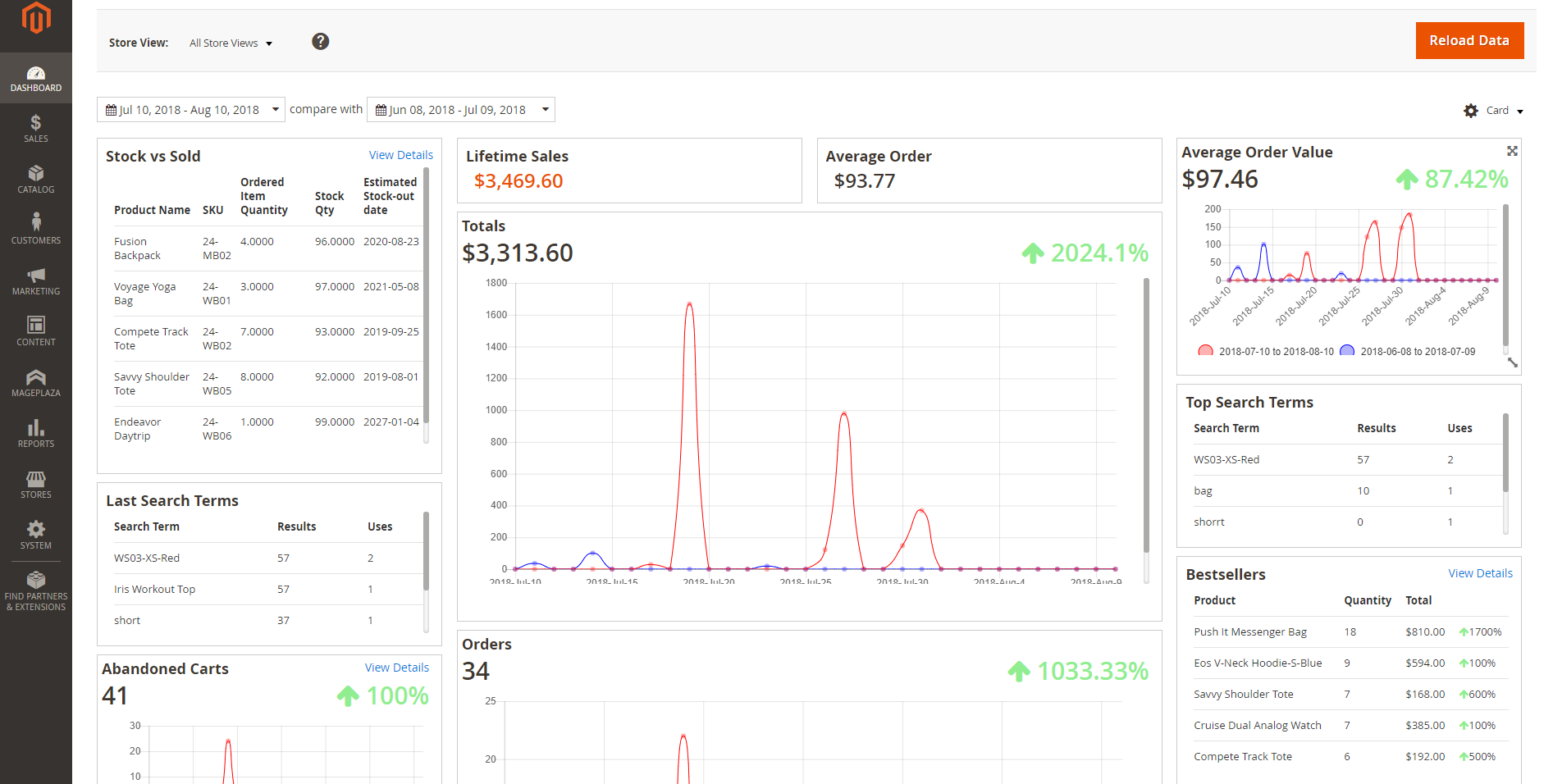
What is it about?
- Bestsellers: This segment of Magento 2 reports highlights the products that are selling the best on your platform. Understanding which products are your top performers is essential for several reasons. It helps in focusing your marketing efforts more effectively, ensuring that you are promoting products that have a proven track record of attracting customers. Additionally, insights into bestsellers guide inventory stocking decisions, ensuring that you are adequately supplied to meet customer demand without overstocking.
- Low Stock: The Low Stock report is a critical alert system within Magento 2 that notifies merchants of products that are nearing stock-out conditions. This timely information is crucial for preventing potential lost sales due to inventory shortages. By keeping a close eye on stock levels, you can ensure a continuous supply of your products, maintaining customer satisfaction and optimizing inventory turnover.
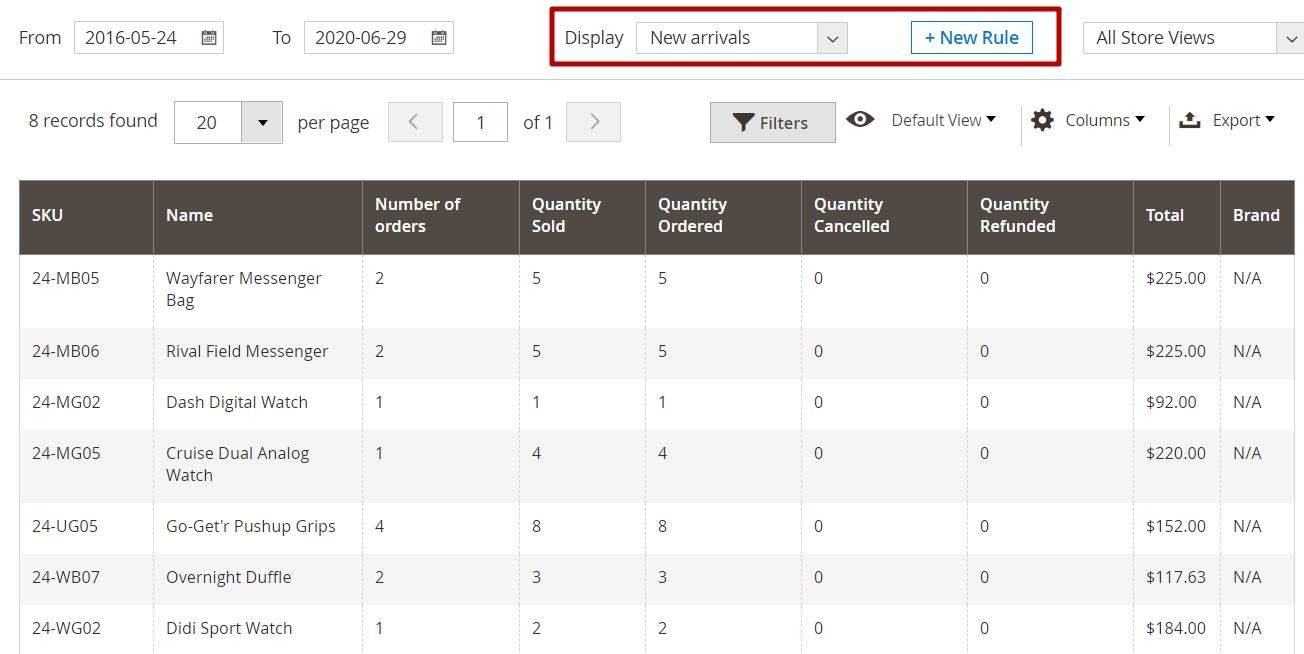
Strategic Application
The strategic application of Product Reports in Magento 2 is multifaceted, impacting several key areas of eCommerce management:
- Optimizing Stock Levels: By analyzing product performance and stock levels, merchants can adjust their inventory strategies to better align with customer demand. This includes increasing stock for bestsellers and reducing it for slower-moving products, thereby minimizing the risk of overstocking and understocking.
- Planning Production or Procurement: Insights from Product Reports also inform production planning or procurement schedules. For products manufactured in-house, understanding demand helps in scheduling production runs more efficiently. For procured products, it aids in timing purchases to ensure stock availability without tying up too much capital in inventory.
- Identifying Promotion and Upselling Opportunities: Product Reports identify not only the current stars of your catalog but also potential candidates for promotions or upselling. Products that are frequently viewed but not necessarily top sellers may benefit from targeted marketing campaigns, discounts, or bundling strategies to convert interest into sales. Additionally, understanding which products are often bought together can inform effective cross-selling and upselling strategies, enhancing the average order value.
Magento 2 reports, especially Product Reports, are crucial tools for merchants aiming to thrive in the competitive eCommerce landscape. They provide a wealth of data on product performance and inventory levels, offering actionable insights that can significantly impact sales strategies, inventory management, and overall business growth.
Marketing Reports
Marketing Reports in Magento 2 are designed to unlock insights into customer engagement and the effectiveness of marketing strategies. These reports delve into various aspects of how customers interact with your marketing efforts and the platform itself, including tracking Products in Cart, analyzing Search Terms, and gauging Newsletter Engagement. Such insights are invaluable for eCommerce businesses aiming to optimize their marketing initiatives, ensuring that they resonate with their target audience and contribute to the overall growth and success of the store.
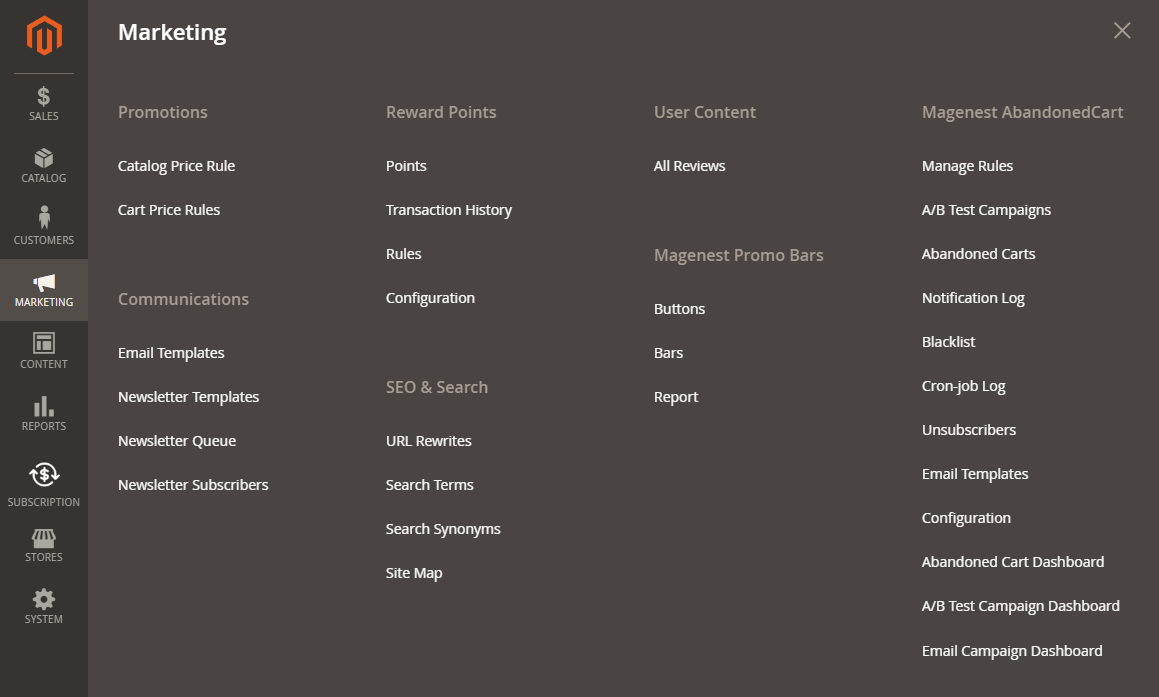
What is it about?
- Search Terms: One of the most powerful features of Magento 2 reports is the ability to track what customers are searching for on your site. This insight is crucial for guiding both SEO strategies and product assortment decisions. By understanding the keywords and phrases customers use, you can optimize your website’s content and meta tags to improve search engine rankings and visibility. Additionally, this data can help identify potential new products or categories that customers are interested in but might not yet be adequately represented in your inventory.
- Products in Cart: Analyzing the products that customers add to their carts but may not necessarily purchase provides a wealth of information for optimizing product offerings and pricing strategies. This aspect of Magento 2 reports can highlight products that are attracting interest but might be facing barriers to purchase, such as pricing, shipping costs, or lack of promotional incentives. Addressing these barriers can significantly improve conversion rates.
- Newsletter Engagement: Newsletter engagement metrics from Magento 2 reports offer a clear view of how email marketing campaigns are performing. This includes open rates, click-through rates, and conversion rates from newsletter content. Understanding the effectiveness of different email marketing strategies enables businesses to refine their approach, focusing on content that drives engagement and sales, and adjusting or discontinuing what doesn’t work.
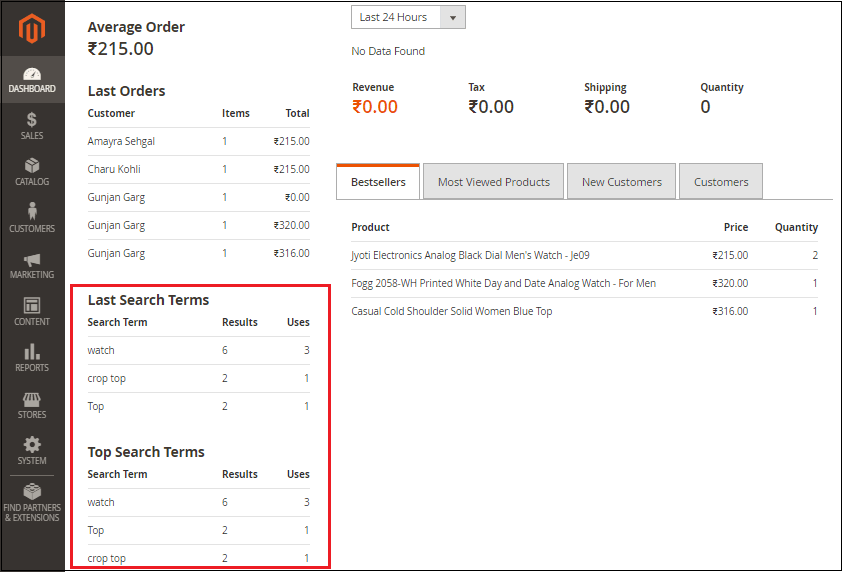
Strategic Application
The strategic application of Marketing Reports in Magento 2 can dramatically refine and improve a store’s marketing approach. By leveraging these reports, businesses can:
- Improve the Relevance of Search Results: Insights from search term analysis can be used to enhance the search functionality on your site, making it more intuitive and responsive to customer needs. This improvement can lead to a better user experience, higher engagement, and increased sales.
- Tailor Content and Promotions: Data on products added to carts and newsletter engagement can inform more targeted and personalized content and promotions. For instance, if certain products are frequently added to carts but not purchased, targeted promotions or discounts can help convert these into sales. Similarly, understanding which types of newsletter content generate the most engagement can guide the creation of more compelling email campaigns.
- Enhance Engagement and Conversion Rates: Overall, the insights gained from Magento 2 Marketing Reports can be used to create a more engaging and effective marketing strategy. Whether through improved SEO, more relevant product offerings, or more compelling email marketing campaigns, these reports provide the data needed to make informed decisions that boost engagement and conversion rates.
Magento 2 reports, particularly Marketing Reports, offer a comprehensive view into how marketing efforts are performing and how customers are interacting with your eCommerce platform. By understanding and acting on these insights, Magento 2 store owners can significantly enhance their marketing strategies, leading to improved customer engagement, higher conversion rates, and ultimately, greater business success.
Review Reports
Review Reports in Magento 2 are pivotal for businesses looking to understand and improve customer satisfaction and product quality. In the vast and competitive landscape of eCommerce, customer reviews are not just feedback; they’re a direct line to your customers’ thoughts and experiences. Magento 2 reports on customer reviews offer detailed insights into how customers perceive your products and services, providing a valuable tool for assessing overall sentiment, identifying strengths, and pinpointing areas needing improvement.
What is it about?
- Trends in Customer Feedback: Magento 2 Review Reports allow businesses to analyze trends over time, distinguishing between top-rated and poorly rated products. This analysis is crucial for identifying patterns in customer satisfaction or dissatisfaction. For instance, a sudden increase in negative reviews for a previously well-regarded product can signal a potential issue with the latest batch, a change in suppliers, or a shift in customer expectations.
- Insights into Customer Satisfaction/Dissatisfaction: Beyond the ratings, Magento 2 reports delve into the reasons behind customer feedback, offering merchants a deeper understanding of what drives satisfaction or dissatisfaction. This might involve product quality, customer service experiences, shipping times, or product usability. Such insights are invaluable for targeted improvements, whether that means enhancing product quality, tweaking designs, or improving customer service protocols.
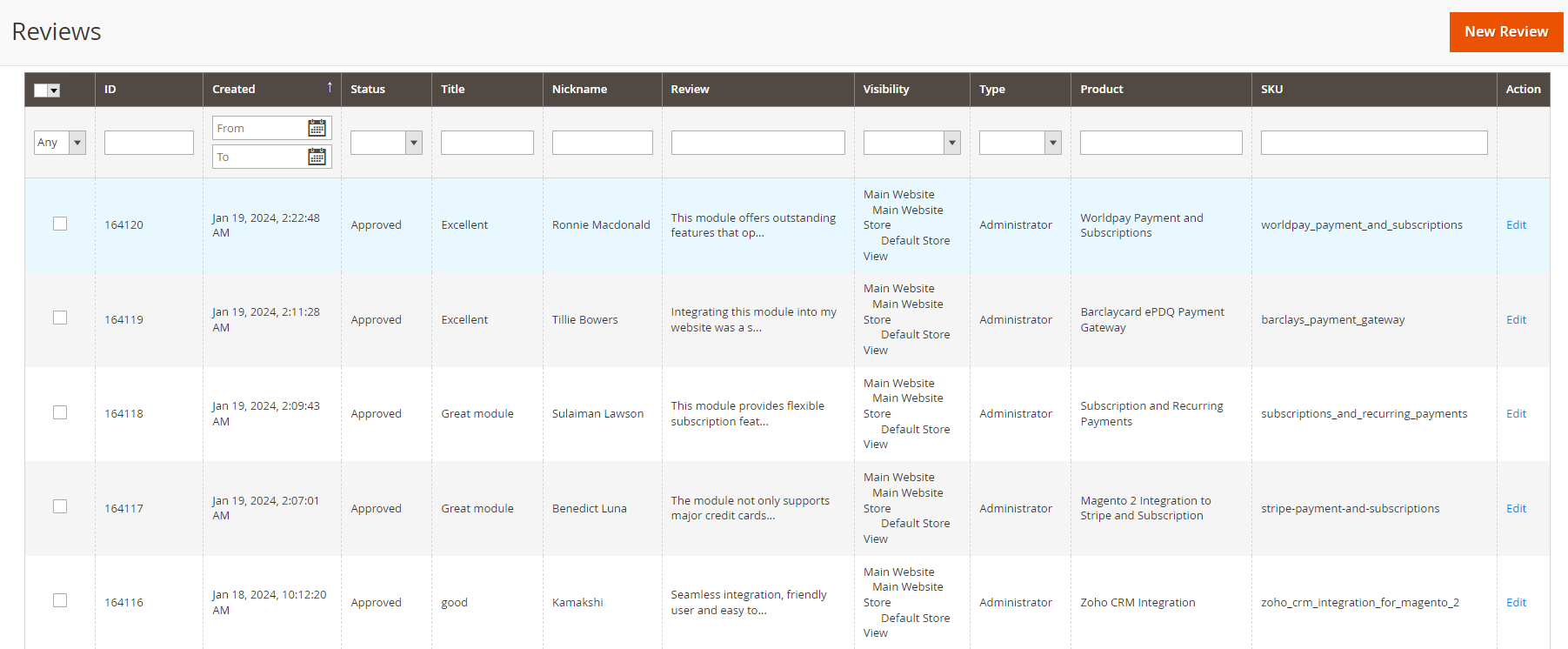
Strategic Application
The strategic use of Review Reports in Magento 2 can significantly impact a business’s approach to product management, customer service, and overall strategy:
- Product Lineup Adjustments: Insights from Review Reports can inform decisions about which products to continue selling, which to improve, and which to discontinue. This ensures that the product lineup remains strongly aligned with customer expectations and market demands.
- Quality Control and Improvement: Analyzing customer feedback helps pinpoint quality issues, guiding efforts to enhance product quality. Whether it’s improving materials, addressing design flaws, or enhancing user instructions, such improvements can lead to higher customer satisfaction and better reviews.
- Enhancing Customer Satisfaction Strategies: Understanding the specifics of customer dissatisfaction allows businesses to implement targeted changes to their customer service approach, potentially turning detractors into promoters. This might involve more responsive customer service, improved return policies, or direct outreach to dissatisfied customers.
- Reputation and Trustworthiness Enhancement: Encouraging satisfied customers to leave positive reviews and promptly addressing negative feedback can significantly improve a brand’s reputation. Proactive management of customer reviews demonstrates to potential customers that the business values feedback and is committed to continuous improvement.
Magento 2 Review Reports offer a goldmine of data that, when used strategically, can drive substantial improvements in product offerings, customer satisfaction, and overall business performance. By closely monitoring and responding to customer reviews, Magento 2 merchants can enhance their brand reputation, build trust with their customer base, and make informed decisions that contribute to long-term success and growth.
Ways to Leverage Magento 2 Reports to Your Advantages
Magento 2 reports are a powerhouse of data and analytics, designed to guide eCommerce businesses towards growth and success. By providing a comprehensive view of sales, customer behavior, and inventory management, these reports enable merchants to make informed decisions that optimize operations, enhance customer engagement, and ultimately, drive revenue. Here’s how businesses can leverage Magento 2 reports across various facets of their operations:
Sales and Revenue Optimization
Sales reports in Magento 2 are instrumental in uncovering patterns in consumer behavior, including trends, seasonality, and preferences. By analyzing sales data over time, merchants can identify periods of high demand, seasonal fluctuations, and customer buying habits. This information allows for strategic planning of marketing campaigns, inventory stocking, and promotional offers to capitalize on peak buying times and cater to customer preferences more effectively.
Along with that, financial health is paramount to the success of any business as well. Magento 2 reports on tax, shipping, and refunds provide critical insights into the financial aspects of sales transactions. Tax reports ensure compliance and efficient tax management, shipping reports offer a view into the profitability of shipping strategies, and refunded reports highlight the impact of returns on overall revenue. Together, these reports enable businesses to manage their finances more effectively, optimizing pricing and shipping strategies to improve the bottom line.
Enhancing Marketing and Customer Engagement
Magento 2 reports on search terms and abandoned carts are crucial for refining marketing strategies. Search term reports reveal what customers are looking for, guiding SEO efforts and product assortment to align with customer searches. Abandoned cart reports, on the other hand, help identify barriers to purchase, allowing merchants to implement targeted strategies to reduce cart abandonment, such as checkout process simplification, targeted discounts, or follow-up emails.
Besides that, newsletters are a vital tool for customer engagement, and Magento 2 reports on newsletter engagement help measure their effectiveness. These insights, combined with customer reports detailing demographics and purchasing behavior, can significantly enhance engagement strategies. Personalized content, targeted promotions, and loyalty programs can be developed to increase customer retention and lifetime value, fostering a loyal customer base.
Inventory Management
Product reports in Magento 2 provide a detailed analysis of inventory performance, including bestsellers and low-stock items. This data is invaluable for managing stock levels efficiently, ensuring that popular products are always available while minimizing excess inventory. By aligning inventory levels with customer demand, businesses can improve cash flow and reduce holding costs.
Additionally, identifying bestsellers allows businesses to focus on products that drive the most revenue while tracking low-stock items ensures that popular products do not run out of stock, potentially losing sales. Magento 2 reports facilitate inventory optimization, enabling merchants to allocate resources more effectively and maintain a balanced product offering.
Decision Making
The dynamic nature of eCommerce requires constant adaptation and decision-making. Magento 2 reports provide refreshed statistics that reflect the latest trends and data, offering a solid foundation for making informed business decisions. Whether it’s adjusting marketing strategies, optimizing inventory, or enhancing customer engagement, up-to-date reports ensure that decisions are based on current realities.
Many businesses can learn how to leverage Magento 2 reports to pivot their strategies successfully. For instance, a merchant might use sales trend data to launch a successful promotional campaign during an identified peak buying period, significantly boosting sales. Alternatively, an analysis of search term reports could lead to an SEO strategy that dramatically increases organic traffic and conversions. These examples underscore the power of Magento 2 reports in driving strategic adjustments that lead to measurable business growth.
Best Practices for Utilizing Magento 2 Reports
Magento 2 reports are a critical component of eCommerce success, offering deep insights into various aspects of the business, from sales and customer behavior to inventory and marketing effectiveness. To fully leverage the power of Magento 2 reports, businesses must adopt a set of best practices that ensure the data is not just collected but also effectively used to drive decision-making and growth.
Regular Monitoring and Analysis
Consistent monitoring of Magento 2 reports is vital for maintaining a pulse on the health and performance of your eCommerce store. Depending on the nature of your business and the specific metrics of interest, establishing a routine for daily, weekly, or monthly checks on key reports can provide timely insights into trends, opportunities, and potential issues. Regular analysis helps in identifying sales patterns, customer behavior changes, and operational efficiencies or inefficiencies, allowing businesses to react promptly and make necessary adjustments.
Magento 2 offers flexibility in reporting, allowing businesses to tailor reports to their unique needs. Custom reports can be set up to focus on specific metrics that are most relevant to your business goals, providing more targeted insights than standard reports might offer. For instance, if your business places a strong emphasis on customer loyalty, creating custom reports to track repeat customer behavior, loyalty program engagement, or customer lifetime value can yield actionable insights that standard reports may not capture.
Integrating with External Analytics Tools
While Magento 2 reports provide a wealth of data, integrating with external analytics tools like Google Analytics can offer a more comprehensive view of your eCommerce performance. These integrations allow for a deeper analysis of user behavior, traffic sources, and conversion paths, offering insights that Magento 2 reports alone might not reveal. For example, combining Magento 2 sales data with Google Analytics traffic and conversion data can help identify the most effective marketing channels and customer acquisition strategies.
Integrating Magento 2 with Google Analytics enables advanced tracking features such as eCommerce tracking, which provides detailed insights into user behavior throughout the purchase process. Other beneficial integrations include email marketing tools and social media analytics, which can help track the performance of marketing campaigns and their impact on sales. These integrations offer a holistic view of your eCommerce ecosystem, enabling more informed decision-making and strategy optimization.
Data Analysis in Decision-Making
The key to leveraging Magento 2 reports is the ability to translate data into actionable business strategies. This involves not just understanding the data but also drawing meaningful conclusions and identifying specific actions to take. For example, if analysis reveals a high number of abandoned carts, strategies might include optimizing the checkout process, offering targeted discounts, or implementing abandoned cart email campaigns to recover lost sales.
Data interpretation can be challenging, and there are common pitfalls that businesses should be aware of. One such pitfall is confirmation bias, where data is interpreted in a way that confirms pre-existing beliefs or hypotheses. To avoid this, approach data analysis with an open mind and be willing to challenge assumptions. Another pitfall is over-reliance on a single data point without considering the broader context. Ensure that decisions are based on a comprehensive analysis of relevant data points, considering both short-term trends and long-term patterns.
Future of Magento 2 Reporting
The landscape of eCommerce reporting is rapidly evolving, driven by advancements in technology and changing consumer behaviors. Magento 2, as a leading eCommerce platform, is at the forefront of adapting to these changes, ensuring that merchants have access to cutting-edge reporting tools and analytics. The future of Magento 2 reporting is poised to be shaped by several emerging trends and technological innovations, promising to transform how businesses understand their operations, customers, and markets.
Emerging Trends in eCommerce Reporting
- Predictive Analytics and AI in Understanding Customer Behavior: One of the most significant trends in eCommerce reporting is the integration of predictive analytics and artificial intelligence (AI). These technologies offer the ability to not just analyze past and current data but to predict future customer behavior, market trends, and potential sales outcomes. Predictive analytics in Magento 2 reports can help merchants identify which products are likely to become bestsellers, forecast sales trends, and even predict customer churn. AI-driven insights can enable personalized marketing strategies, optimize inventory management, and enhance customer service by anticipating needs and addressing them proactively.
- Real-time Reporting and Its Significance: Real-time reporting is becoming increasingly important in today’s fast-paced retail environments. Magento 2’s evolution towards offering real-time reporting capabilities means businesses can make quicker, more informed decisions. Real-time data allows merchants to monitor their eCommerce performance as it happens, from sales and customer activity to inventory levels. This immediacy can be crucial for responding to rapid market changes, managing stock more efficiently, and capitalizing on sales opportunities the moment they arise.
Magento’s Evolution and Reporting
As Magento continues to evolve, it’s expected that Magento 2 reporting capabilities will expand to include more advanced analytics, AI and machine learning integrations, and enhanced real-time reporting features. These developments are likely to offer deeper insights into customer behavior, more accurate forecasting, and the ability to automate complex reporting tasks. Additionally, we may see improved user interfaces for reporting dashboards, making complex data more accessible and actionable for merchants.
To stay ahead of these advancements, businesses should focus on a few key areas to prepare for and adapt to the future of Magento 2 reporting:
- Invest in Skills and Training: As reporting capabilities become more advanced, having a team with the skills to interpret and act on complex data insights will be crucial. Investing in training for your team or collaborating with data analytics experts can ensure your business is ready to leverage new reporting features as they become available.
- Stay Informed on Magento Updates: Keeping up-to-date with Magento’s latest releases and updates is essential for taking advantage of new reporting features and improvements. Regularly check Magento forums, attend webinars, and participate in the Magento community to stay informed.
- Embrace Automation and AI: Begin exploring how automation and AI can be integrated into your current reporting processes. This could involve using third-party tools that complement Magento’s native capabilities or preparing to adopt Magento’s future AI-driven reporting features.
- Focus on Data-Driven Decision Making: Cultivate a culture that values data-driven decision-making within your organization. As new reporting tools and analytics become available, businesses that are adept at using data to guide their strategies will be better positioned to benefit from Magento’s advancements in reporting.
The future of Magento 2 reporting promises to bring significant advancements in how eCommerce businesses analyze data, understand their customers and make strategic decisions. By staying informed, investing in the right skills, and embracing new technologies, merchants can fully leverage these upcoming changes to drive growth and achieve greater success in the competitive eCommerce landscape.
Conclusion
In conclusion, the journey through the capabilities and potentials of Magento 2 reports highlights the immense value these analytics tools offer to eCommerce merchants. Whether you’re a small business owner just beginning to leverage the power of Magento 2 or a large enterprise seeking to optimize your data analysis processes, the insights provided by Magento 2 reports are indispensable. We encourage you to implement the strategies discussed, leveraging Magento 2 reports to drive business growth, enhance customer satisfaction, and navigate the complex landscape of eCommerce with confidence and precision.
If you are looking for assistance with your Magento 2 sites, check out our Magento Development Services right below to see how our certified Magento developers can help your businesses.











